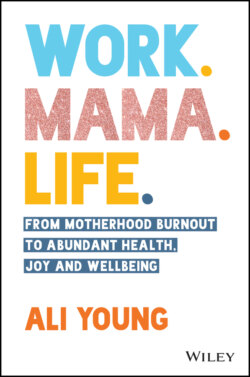Читать книгу Work. Mama. Life. - Ali Young - Страница 20
Intergenerational mothering: how our mothering is passed along
ОглавлениеExpectations can play a large part in mothering. We've kind of established that now. It would be remiss of me to not have a chat about how the generations of mothering that we observe impact how we mother. According to the Center on the Developing Child at Harvard University, our brain lays down the majority of its circuits and pathways in the first few years of life (up until six to seven years of age). My theory is that we learn how to mother from how we are mothered in those first few years. I mean, have you ever listened to yourself and thought, Holy shit — I sound exactly like my mum!
I often wonder how these early years nurturing moments that we experience as a child play out in the subconscious roll-out of our own mothering? How do we take them on board and create our level of expectation of our own mothering?
Researchers such as Madden and associates call this theory ‘intergenerational parenting’. They look at how our own maternal mothering can play out in the way we express our mothering habits. In their excellent study, they found that the parenting ideals shown by grandmothers are associated with the parenting actions of both the mothers and the fathers. Basically, this tells us that how we choose to show up for our kids could be of benefit for their children in the future. That's pretty epic — and also a little bit stressful, particularly when your mean girl is telling you that you are not doing a great job. This is where knowledge doesn't always bring freedom. If we are experiencing anxieties around ‘how good we are’ and the ‘good enough mother’ phenomenon, this knowledge can bring some relief as to why you do things in such an ingrained and certain way.
However, shifting this lens a little, we can see how the role that our predecessors in this parenting gig played could genetically and sociologically impact the things we believe, the structures we choose to bring to our mothering and the way we can make it work. At the very least, we can perhaps see where our mean girl voice might come from sometimes, an expectation that has shown up from early nurturing.
One of my dearest girlfriends reflects on this quite often. She is the mother to two young kids (at the time of writing), and she had to wade through many years of infertility to get her kids. Through this, she developed strong expectations that she would not be the martyr mother (the mother who gives everything to their kids, leaving nothing in the tank) and would be a ‘good mum’ — because she knew she wanted something different for her own mothering compared to how her mum mothered her. Her kids were really hard to come by, so to be the best mother that she could possibly be for her much desired family she had to be true to herself!
Throughout her childhood, her mum made a big deal of being the martyr, of doing everything for her kids. And, as they got older, of letting them know about it too. She showed up as the mum who gave up her everything for them. As my girlfriend began her mothering journey as an older mum with a career to boot, she was highly aware of this story and worked hard at honouring herself and not letting go of who she was. It could have been easy for her to slip into martyr mode — but she knew that wasn't what she wanted.
She did this because this was the model she was shown and she didn't want it. Being aware enough to honour herself, her own desires and who she needed to be, and to show up as the mother she wanted to be, was such beautiful mothering to witness.
